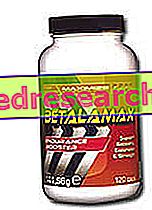
What is Norvir?
Norvir is a medicine that contains the active substance ritonavir. It is available in oral solution (80 mg / ml) and in white colored capsules (100 mg).
What is Norvir used for?
Norvir is indicated in combination with antiviral medicines to treat patients over two years of age with human immunodeficiency virus type 1 (HIV-1) infection, a virus that causes acquired immune deficiency syndrome (AIDS).
The medicine can only be obtained with a prescription.
.
How is Norvir used?
Norvir should be administered by a doctor who has experience in the treatment of HIV infection. It must be taken on a full stomach.
Norvir is used in two ways:
- is used as a "pharmacokinetic enhancer (booster)" to increase the hepatic levels of antiviral drugs belonging to the same class as Norvir (protease inhibitors), ie amprenavir, atazanavir, fosamprenavir, lopinavir, saquinavir, tipranavir and darunavir. The standard dose for adults is 100 mg or 200 mg, once or twice a day. The dose depends on the type of associated protease inhibitor. For more information, see the leaflet attached to the associated drug;
- Norvir can also be used as an antiviral drug. The recommended dose for adults is 600 mg twice a day. For children, the recommended dose depends on the area of the body surface (calculated using the height and weight of the child). Treatment should start with a reduced dose of the drug, which is gradually increased over a 14-day treatment period. For more information, see the package leaflet.
How does Norvir work?
The active substance in Norvir, ritonavir, acts as a pharmacokinetic enhancer by inhibiting the activity of a liver enzyme called CYP3A, which has a very important function in the metabolism of medicines, including some antiviral drugs. By slowing down the rate of decomposition of these medicines, it increases their concentration in the blood and increases their antiviral activity.
At higher doses Norvir acts as a protease inhibitor, ie it blocks a viral enzyme called protease, which is involved in the reproduction of HIV. If the enzyme is blocked, the virus is unable to reproduce normally and this slows down the spread of the infection.
Norvir, taken in combination with other antiviral medicines, decreases the amount of HIV in the blood and keeps it at a low level. Norvir does not cure HIV infection or AIDS, but it may delay the damage to the immune system and the development of infections and diseases associated with AIDS.
How has Norvir been studied?
Norvir, as a pharmacokinetic enhancer, has been examined in clinical trials to evaluate the effect of the antiviral drugs it needs to enhance. Information on these studies can be found in the EPARs of these other medicines.
Norvir, as an antiviral drug, has been studied in two main studies involving 1 446 patients. In the first study, Norvir was compared with placebo (a dummy treatment) in 1, 090 adults as adjunctive therapy to antiviral drugs already in use by the patient. The main measure of effectiveness was based on the number of patients showing a worsening of the disease or dying. In the second study, Norvir taken alone, zidovudine (another antiviral drug) taken alone, and the combination of Norvir and zidovudine in 356 adults who had not previously received any treatment for HIV infection were compared. The main measure of effectiveness was the change in the level of HIV in the blood (viral load) and the number of CD4 T cells in the blood (CD4 cell count). CD4 T cells are white blood cells that play an important role in fighting infections and are killed by HIV. The effects of Norvir as an antiviral drug in combination with other antiviral drugs have also been analyzed in four studies in children.
What benefit has Norvir shown during the studies?
In the first study of Norvir as an antiviral drug, 16% of cases treated with Norvir (86 of 543 patients) reported worsening of the disease or death, compared with 33% of patients treated with placebo (181 out of 547). In the second study, greater reductions in viral load and an increase in CD4 cell counts were observed in patients taking Norvir compared to subjects treated with zidovudine alone. The combination of Norvir and zidovudine was less effective than Norvir alone, although the reasons for this result are unclear. Norvir in combination with other antiviral drugs reduced viral load even in children.
What is the risk associated with Norvir?
When Norvir is used as a pharmacokinetic enhancer the side effects depend on the other antiviral medicine taken. Some medicines cannot be taken with Norvir when it is used in this way. For more details, see the leaflet supplied with the associated drug.
When Norvir is used as an antiviral drug, the most common side effects (seen in more than 1 patient in 10) are alteration of taste (unusual taste in the mouth), perioral and peripheral paraesthesia (disturbance of sensitivity around the mouth or in the hands or feet) ), headache, abdominal pain (stomach ache), nausea, diarrhea, vomiting and asthenia (weakness). For the full list of all side effects reported with Norvir, see the Package Leaflet.
Norvir should not be used in people who may be hypersensitive (allergic) to ritonavir or any of the other ingredients. It must not be used by patients with severe hepatic impairment or by patients taking the following medicines:
- alfuzosin (used to treat benign prostatic hyperplasia or BPH, increase in prostate gland volume);
- pethidine, piroxicam, propoxyphene (used for pain relief);
- amiodarone, bepridil, encainide, flecainide, propafenone, quinidine (used to correct cardiac arrhythmia);
- fusidic acid, voriconazole at 400 mg doses of Norvir two or more times a day, rifabutin when Norvir is used as an antiviral drug (medicines used to treat infections);
- astemizole, terfenadine (commonly used in the treatment of allergic symptoms; these drugs can be purchased without a prescription);
- clozapine, pimozide (used to treat mental illness);
- dihydroergotamine, ergonovine, ergotamine and methylergonovine (used in the treatment of headache);
- cisapride (used to relieve some stomach problems);
- lovastatin, simvastatin (used to lower blood cholesterol levels);
- sildenafil, when used to treat pulmonary arterial hypertension (high blood pressure in the arteries of the lungs);
- clorazepate, diazepam, estazolam, flurazepam, midazolam taken orally, triazolam (used to relieve anxiety or sleep disorders);
- St. John's wort (a vegetable preparation used in the treatment of depression).
As with other anti-HIV drugs, patients taking Norvir may be at risk for lipodystrophy (changes in body fat distribution), osteonecrosis (death of bone tissue) or immune reactivation syndrome (inflammatory signs and symptoms caused by system reactivation). immune). Patients with liver problems (including hepatitis B or C) may be at an increased risk of developing liver damage when treated with Norvir.
Why has Norvir been approved?
The Committee for Medicinal Products for Human Use (CHMP) decided that Norvir's benefits in combination with other antiretroviral drugs outweigh its risks in the treatment of HIV-1 patients. The Committee recommended that Norvir be given marketing authorization. Norvir was initially authorized in "exceptional circumstances" because at the time the authorization was granted only limited information was available for scientific reasons. Since the pharmaceutical company provided the additional information requested, the condition "in exceptional circumstances" lapsed on 13 March 2001.
More information on Norvir:
On 26 August 1996, the European Commission granted Norvir a marketing authorization valid throughout the European Union to Abbott Laboratories Limited. The marketing authorization is valid indefinitely.
The full EPAR for Norvir can be found here.
Last update of this summary: 10-2009



